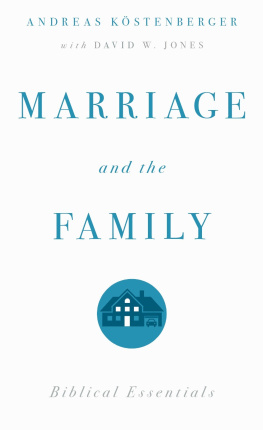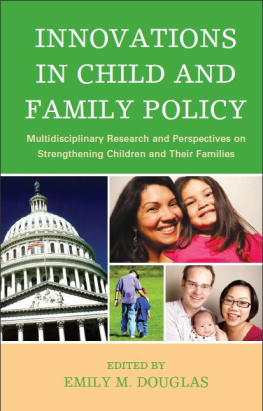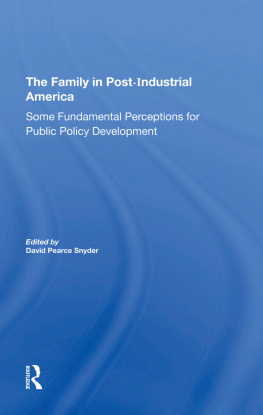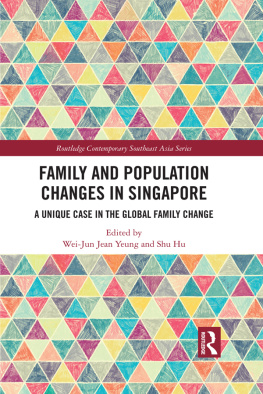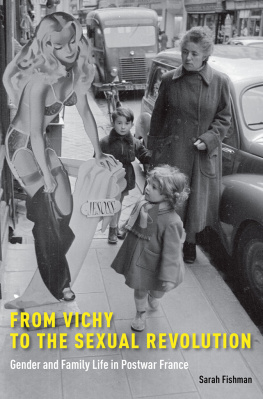First published 2005 by Transaction Publishers
Published 2017 by Routledge
2 Park Square, Milton Park, Abingdon, Oxon, 0X14 4RN
711 Third Avenue, New York, NY 10017, USA
Routledge is an imprint of the Taylor & Francis Group, an informa business
Copyright 2005 by Taylor & Francis.
All rights reserved. No part of this book may be reprinted or reproduced or utilised in any form or by any electronic, mechanical, or other means, now known or hereafter invented, including photocopying and recording, or in any information storage or retrieval system, without permission in writing from the publishers.
Notice:
Product or corporate names may be trademarks or registered trademarks, and are used only for identification and explanation without intent to infringe.
Library of Congress Catalog Number: 2004051291
Library of Congress Cataloging-in-Publication Data
Carlson, Allan C.
Fractured generations : crafting a family policy for twenty-first century
America / Allan Carlson.
p. cm.
Includes bibliographical references and index.
ISBN 0-7658-0275-9 (alk. paper)
1. FamilyUnited States. 2. Family policyUnited States. I. Title.
HQ536.C373 2005
306.850973dc22
2004051291
ISBN 13: 978-0-7658-0275-0 (hbk)
Fifty years ago, the phrase family policy was rarely heard in America. Responding to plunging birthrates, the West European nations had constructed population policies during the 1920s and 1930s to stimulate fertility, but nothing of the sort happened here. Some form of welfare policy, including social insurance and means-tested relief, was common by then to most industrial societies, including the United States. The American states also maintained laws governing marriage, divorce, education, inheritance, and child protection, which regulated the formation, childrearing practices, and dissolution of families. Moreover, the growing burden of income taxation required judgments regarding the treatment of marriage and children. Yet these scattered policy areas were rarely seen as closely related.
The primary reason for this, it seems, was actually the continued normative strength of the idea of The American Family. Most Americans still knew in 1954 what family connoted: it meant marriage, householding, children, and care of the aged; it meant a bonding of the generations. The family, as such, was normal and natural, part of the expected course for each adult life.
The American past seemed to support this laissez faire view, as well. For example, the Founders rarely talked about family and the word is not found in the Constitution. Clearly, though, this was not because they cared too little for it; rather, family was so central to their lives as to barely need mention. Indeed, it is arguable that the American nation was unusually family-centric, from its colonial origins through the mid-twentieth-century baby boom. Family policy as such could be deemed unnecessary, for it was quietly assumed by lawmakers and citizens alike that all policies would naturally be in favor of the family.
In practice, though, this assumption did not entirely hold up. As far back as the 1840s, state policies regarding the common schools and child protection were already contributing to a quiet weakening of families; certain progressive innovations in the early twentieth century (such as the idea of the school as a substitute for the family) did so as well. Still, it was only during the 1960s that attacks on the family in America grew open and widespread. Equity feminists objected to a home economy resting on the breadwinner/home-maker/three-child model found in the burgeoning American suburbs, and assaulted its core institution: the family wage paid to fathers. Neo-Malthusians fretted over the healthy fertility numbers recorded during the 1950s and propagandized for zero- and then negative-population growth. The sexual revolutionaries, ranging from slick publicists like Hugh Hefner to pseudoscientific sexologists at the Kinsey Institute, labored to sever the bonds between sex and marriage and sex and procreation. Militant secularists turned to the federal court system to challenge the place of religiously grounded morality in American public life.
These four ideological movements did score dramatic successes in their common campaign to disrupt American homes. The U.S. Supreme Court banned prayer in public schools in 1963, affirmed contraception as a right in 1968, did the same for abortion in 1973, devalued fathers rights in 1976, and, most recently, crafted rights to sodomy and homosexuality (2003). Meanwhile, the U.S. Congress shifted the income tax burden away from the unmarried, the childless, and the mega-corporations, placing it instead on the backs of married couples with two or more children. Congress also gave rich new subsidies to parents using daycare; families with a parent full-time at home got nothing. For their part, federal regulators squelched the cultural assumptions that had sustained the family wage ideal.
These unprecedented political and legal challenges had results. The marriage boom and the baby boom of the 1940-64 era were replaced by the baby bust and the retreat from marriage that marked the next forty years. Marital fertility fell sharply while the divorce rate and out-of-wedlock birthrate soared. The elderly flowed into age-segregated housing and nursing homes. By the year 2000, the bonds of the generations were rent, or fractured, in America.
One lesson of history is clear: No nation can go forward, or even survive, without a durable family system. The family is the source of new life and the crucible of character that makes ordered liberty possible. Contemporary family policy represents an attempt to counter the negative forces of the last four decades and to restore the natural family to its necessary place in American life.
As a foundation, effective family policy requires a normative definition of the family against which policy goals and results might be measured. In this book, the definition used comes from a preparatory session for the World Congress of Families II, held in May 1998. Gathering in a room dating back to the second century B.C. in the Eternal City of Rome, representatives from the worlds nations and faiths (including this author) agreed that:
The natural family is the fundamental social unit, inscribed in human nature, and centered around the voluntary union of a man and a woman in a lifelong covenant of marriage for the purposes of: satisfying the longings of the human heart to give and receive love; welcoming and ensuring the full physical and emotional development of children; sharing a home that serves as the center for social, educational, economic, and spiritual life; building strong bonds among the generations to pass on a way of life that has transcendent meaning; and extending a hand of compassion to individuals and households whose circumstances fall short of these ideals.
All healthy human societies rest on this common social form, which is rooted in turn in a shared human nature, an aspect of the Creation (ref. Genesis 1 and 2). It is true that around this universal definition, distinctive national qualities of family living also emerge. Even so, it is more accurate to refer to The Family in America (or, say, The Family in Canada or The Family in Kenya) rather than to The American Family. The former term correctly implies that each nation may be judged by the manner in which it treats the natural and universal human family unit. Put into shorthand, then, contemporary family policy should aim at securing the stability, the autonomy, and the fecundity of the natural family in America.


